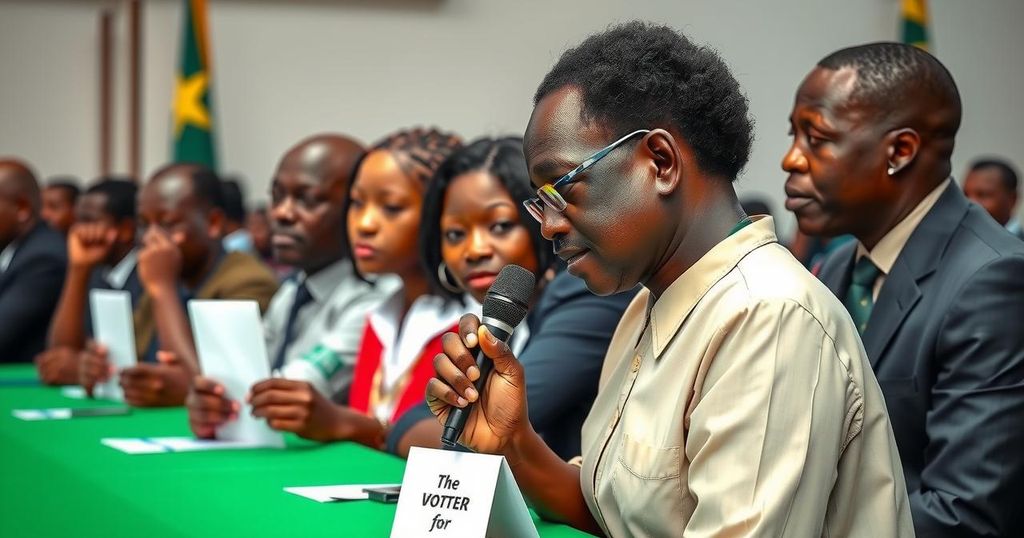Gabon Votes Overwhelmingly in Favor of New Constitution
The military junta in Gabon has announced provisional results indicating overwhelming support for a newly proposed constitution, with 91.8% of voters in favor. The new constitution introduces term limits for the presidency, eliminates a prime minister’s role, and establishes criteria for presidential candidates. Despite claims of government propaganda, many citizens expressed faith in the process, though concerns about transparency and legitimacy linger.
The provisional results published on Sunday reflect that Gabon’s military rulers have successfully garnered overwhelming support for a new constitution in a recent referendum. With approximately 860,000 registered voters, the voting process was characterized by extensive encouragement from the authorities via various media channels. The newly ratified constitution proposes a presidency limited to two seven-year terms, eliminates the role of a prime minister, and prohibits dynastic succession, paving a new political landscape for the nation.
According to the Committee for the Transition and Restoration of Institutions (CTRI), 91.8% of voters supported the constitutional changes. However, voter turnout was reported at 53.54%, considerably lower than the 71% indicated by Gabon TV. Notably, the voting process was described as peaceful, taking place in 2,835 polling stations open until 6:00 PM. The junta instituted an extended night curfew during the electoral process to maintain security.
A pivotal element of the new constitution mandates that presidential candidates must be Gabonese by citizenship, requiring at least one parent to be Gabonese and necessitating a Gabonese spouse. This provision effectively disqualifies the former ruler, Ali Bongo Ondimba, further cementing the transition’s political implications. The transitional president, Brice Oligui Nguema, proclaimed the referendum a significant advancement while expressing his intentions to restore civilian governance eventually, having previously vowed to achieve this within a two-year framework.
Within the context of the referendum, there have been claims of propaganda that might cast a shadow over the legitimacy of the vote. Local media have drawn attention to what they consider a presidential campaign disguised as a referendum, referencing the prominent displays encouraging a ‘yes’ vote. Voter sentiments reflect a divide, with some citizens expressing confidence in the military’s intentions while critics argue that the constitution is designed to facilitate a dictatorship.
The interior ministry asserted that efforts were made to ensure transparency during the referendum, including an invitation to international observers who were not present in the previous election. The results are still awaited from the constitutional court, but surveys indicate that many Gabonese citizens believe the country is moving in the right direction, despite concerns regarding employment and living conditions.
Gabon, an oil-rich nation in Central Africa, faced significant political upheaval following a military coup in August 2023 that resulted in the ousting of President Ali Bongo Ondimba. This coup was preceded by allegations of electoral fraud, which ignited widespread protests and condemnation from various sectors. The military government, known for its authoritarian tendencies, initiated a referendum to pass a new constitution, which is seen as a critical step in solidifying its power while attempting to appeal to the populace amidst rising dissatisfaction with previous governance. Key components of this new constitution aim to restrain presidential power, thus reshaping the political fabric of Gabon.
In summary, the provisional approval of Gabon’s new constitution signifies a major development under the military regime, with enormous implications for the future political landscape. The overwhelming support from voters for the new constitutional measures indicates a desire for change among the populace, though questions regarding the transparency of the referendum process remain. Additionally, as the military junta seeks legitimacy, the newly established rules regarding candidacy and governance shape a potentially transformative period for Gabon that favors native citizens in leadership roles, while potentially sidelining previous regimes.
Original Source: www.tiogapublishing.com




Post Comment